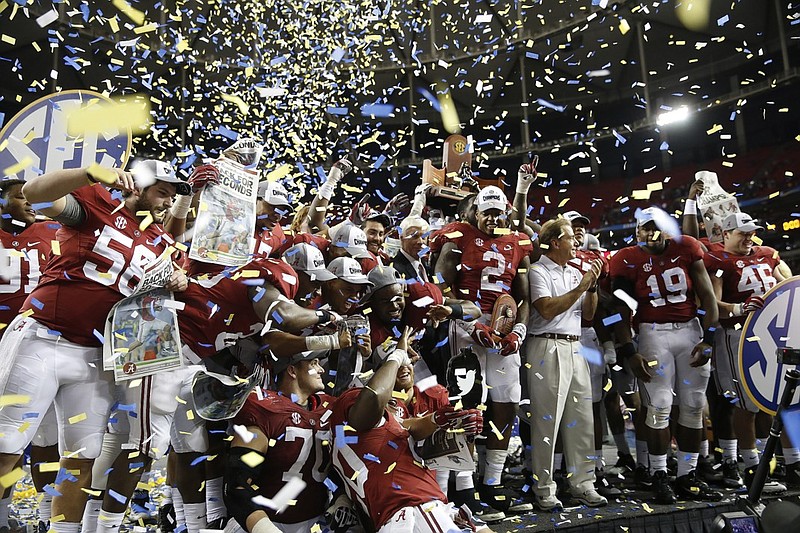WHERE THEY’RE PLAYING
Most future sites for major SEC athletic competitions are set for the foreseeable future, with baseball the exception.› Football: The SEC title game is set in Atlanta through the 2026 season, with the venue changing from the Georgia Dome to Mercedes-Benz Stadium after this December.› Men’s basketball: Nashville’s Bridgestone Arena will host the league tournament every year through 2025, with the exception of the 2018 (St. Louis) and 2022 (Tampa) events.› Women’s basketball: The 2017 league tournament will be held in Greenville, S.C., with the 2018 event in Nashville.› Baseball: Hoover Met near Birmingham, Ala., has hosted the SEC tournament for 19 years, but no sites have been determined past this spring. Hoover, Jacksonville, Fla., Memphis, Nashville and New Orleans have submitted bids to host future SEC tournaments, and an announcement could come this week.
At the Southeastern Conference spring meetings last year, coaches and athletic directors dealt with the new "cost of attendance" measures that provided student-athletes with more spending money than before.
At this year's meetings this week in Destin, Fla., the time demands placed on student-athletes are certain to be discussed.
In February, the NCAA distributed nearly 50,000 surveys to coaches, athletes and administrators at all 346 of its schools with the desire of finding ways athletes could better manage the demands of their respective sports. Limiting games during exams and having a minimum of eight overnight hours between competitions and practices were just two proposals mentioned.
Georgia director of sports medicine Ron Courson pointed out that his school's student-athletes can average as little as 5 1/2 hours of sleep a night.
"I do not expect any proposals coming out of Destin as far as time demands, but there will be a lot of discussion about the time demands these student-athletes have to participate in their sport," SEC associate commissioner Herb Vincent said. "This is the first time that we'll meet as a group of coaches and athletic directors and administrators to talk about the results of the NCAA survey and how we're going to move forward with the other autonomy conferences in addressing those issues."
The meetings begin Tuesday and run through Friday, when commissioner Greg Sankey is expected to announce another record revenue distribution.
Satellite camps will be discussed by the league's football coaches, while men's basketball coaches will continue to seek ways to enhance the league's image after just three SEC teams received NCAA tournament bids for a third time in four years. Time demands, however, are felt by student-athletes of all sports, and Vincent said it's a complicated issue.
"One of the proposals is giving everybody two weeks off after the conclusion of their playing season," Vincent said. "That may work for football after bowl games, but swimmers are Olympic athletes who may want to continue to train, and it's the same with track athletes, so they may want time off somewhere else.
"Baseball players can go straight from the College World Series to the Cape Cod League, so the time-demand issues can be different with each sport."
The Pac-12 held its spring meetings last week and released an alarming 22-page report declaring that athletes' academic sacrifices include having to change their majors due to practice and competition schedules. The report added that student-athletes in most sports are missing significant class time due to travel and have a difficult time attending labs, participating in required internships and completing required clinical or observation hours.
"When I tried to major in economics, they told me you're either going to miss a lot of class or a lot of practice," one Pac-12 student-athlete said in the report. "It didn't sound like an option."
Vincent said the SEC is very aware of the Pac-12 report and expects it to be part of this week's discussion.
Collaborative replay
The SEC recently announced collaborative replay would be used during the upcoming football season, with a command center at the league office in Birmingham, Ala., giving officials extra eyes for reviewing plays.
SEC coordinator of officials Steve Shaw is expected to outline his plan to coaches and athletic directors this week, and one prominent goal is to keep from extending the length of games.
"Every play will involve the command center, and it's similar to what the NFL does," Vincent said. "It's not going to be a deal where if they can't decide in the stadium they will look to the command center. You've got more eyes looking at it, so the thought is that you will come to a conclusion quicker.
"If you have a targeting call in Athens and then a targeting call in College Station later in the day, you will have the same folks looking at it and not applying the rules differently. We want more consistency without adding more time."
Noticeable absence
For only the fourth time since 1990, the quotable Steve Spurrier will not be at the SEC spring meetings.
Spurrier was Florida's football coach from 1990 to 2001, winning six league titles in those 12 seasons, and he was South Carolina's coach from 2005 until his abrupt resignation midway through last season.
"It won't be the same unless he shows up," Vincent said. "Nobody has said he can't vacation in Destin at the same time we do. Maybe he'll show."
Contact David Paschall at dpaschall@timesfreepress.com or 423-757-6524.
